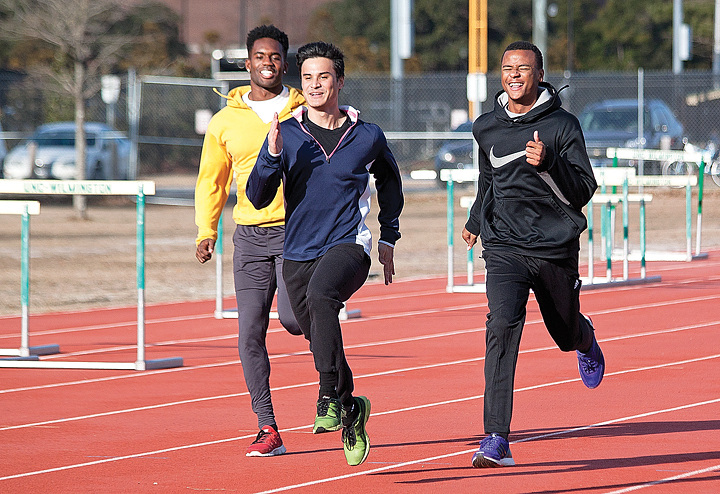University of North Carolina Wilmington freshmen Rian Fowler, Zac Harris and Maurice Holmes sprinted around the school’s oval track Monday, Jan. 26, grinning with the exhilaration of racing at full speed. Nearby, laughter sounded from another cluster of athletes practicing discus throws. Throughout the complex, various UNCW track and field team members continued training for their upcoming events, showing little effect of the recent announcement the 2015 spring season would be their last as a team.
The student-athletes first became aware Dec. 8, 2014, their sport might be eliminated when athletic director Jimmy Bass met with students from four athletic programs — outdoor men’s track and field, outdoor women’s track and field, indoor women’s track and field and men’s cross country — and announced that due to an analysis of financial sustainability within the athletic department, their sports would be discontinued for the 2015-16 season.
It took a moment for the athletes to realize the implications of Bass’ words.
“We were all just extremely shocked,” junior Mikayla Kinloch said. “Everyone was really upset, really confused.”
They were confused, Kinloch said, because the track and field upperclassmen dealt with a similar scenario their freshman year. In 2013, five UNCW teams were jeopardized, including men’s cross-country and men’s track and field. Following a massive show of public support for the teams — student-athletes, parents, faculty and staff engaged in similar rallies and fundraising efforts — and former Chancellor Gary Miller ultimately decided not to cut the programs.
In a Jan. 23 announcement, Interim Chancellor William A. Sederburg officially eliminated the four programs, stating recent private pledges amounting to $142,743 were far below the $10 million needed for a decently funded program. Furthermore, the statement went on, the track and field facility would need expensive renovations if it were to ever host a competition.
It was not an easy decision, Sederburg wrote, but one made for the good of the athletic program as a whole.
“We can’t support 18 or 19 programs,” Bass explained during a Jan. 23 phone interview. “We’ve got the smallest budget in the CAA (Colonial Athletic Association) and we’ve got to be able to operate within our means.”
Kinloch said in retrospect, their efforts to raise funds and rally support might have been in vain. She said it was possible the decision to cut the programs was essentially final in December.
“It was their way of satisfying us, in a sense,” she said.
Track and field head coach Jim Sprecher also voiced his frustration with the decision. He took over the track and field team in 1992 with 23 athletes, he said, and transformed it into the most successful program in conference history with around 100 athletes.
“When you’ve brought the program from scratch, and put your heart and soul into it, the best way to describe it is frustrating,” Sprecher said.
While the discontinuation of the program also eliminates his coaching position, he said his focus now is helping his athletes figure out their next steps. Each athlete’s situation varies, he said, based on his or her year and field of study.
As a freshman, Aaron Hamilton still has three years of eligibility, but he plans to give up his collegiate athletic career to complete his exercise science degree at UNCW. He said would miss being a part of the team, though.
“We’re our own little family. … We’re a very group-based team, as individualistic as track can be. It’s really nice to have such a supportive group,” Hamilton said.
Sophomore Vincent Ragland agreed, but said he hopes to find that kind of team camaraderie at another school where he can continue to run competitively.
“We’re always cheering each other on,” he said. “Everybody is close, so I definitely want to go somewhere I can find those kinds of relationships with teammates again.”
For those students remaining at UNCW, Bass said, the school will honor all scholarships until graduation. Students switching schools should not have too much difficulty transferring their academic credits, he added.
As a junior, Kinloch said, she is too far into her major to transfer. And as for the scholarship continuation, it’s a nice gesture, she said, but it doesn’t lessen the sting of losing her team and her sport.
“I can tell you right now, there’s no one out here who is here for the money,” Kinloch said.
With their first meet approaching in March, Kinloch said she hopes her teammates can channel the emotions of the past month into a memorable final season.
“We can use this . . . and manifest it into something good, use it as a way to keep working and show them that you eliminated a team that can still produce champions,” she said.
email [email protected]




